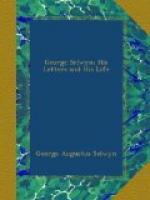(196) Lord George Sackville Germaine, on his resignation of the Secretaryship of the Colonies, was, in February, 1782, created a peer as Viscount Sackville of Drayton Manor, Northampton. Thereupon the Marquis of Carmarthen brought forward a motion in the House of Lords that it was derogatory to the honour of the House that any person under the censure of a court martial should be raised to the Peerage. The motion was defeated, but was repeated on February 18th after Lord Sackville had taken his seat. Though personal in its form, this was simply a Parliamentary attack on the Ministry and the Crown. Sackville had at the battle of Minden, in 1759, disobeyed the orders of Prince Ferdinand of Brunswick, the commander-in-Chief, by refusing to advance with the cavalry. In the following year he was dismissed by court martial from the army. The use made of an event more than twenty years old illustrates the temper of the Opposition. The subject is referred to in a subsequent letter, see p. 198.
(197) Welbore Ellis, appointed Secretary of State for the Colonies March 8, 1782.
(198) William Beckford (1759-1844), son of the well-known member of Parliament and Lord Mayor. As a boy of nine, he came into possession of a property of a million. “Neither his genius nor his fortune yielded what they would have produced to a wiser and better man. . . . Hardly any other man has produced such masterpieces with so little effort.” He was the author of “Vathek,” an Oriental romance, and other works. He was an enthusiastic collector, and he made Fonthill, where he lived in later life in eccentric seclusion, a complete museum.
(1782,) Feb. 19, Tuesday morning.—I wish that I could repeat and describe, as well as I can hear and attend to what is said to me, when people speak sense and to the purpose, and are not trying to mislead you. When I went to Brooks’s it was in search of the Duke;(199) there I found him at dinner, altercating Lord Sackville’s cause, and Stirling, with Charles, Lord Derby, &c., &c. You may imagine with what candour and fairness his arguments were received. I am, it is certain, a friend to him, and not to Charles, but all partiality or prejudice laid aside, I think my friend as good a reasoner as the other; but one employs his faculties in the search of truth, and the other in disguising it and substituting falsehood in its room, to serve the purpose of Party.
I soon left them and went to White’s; I like the society there better. There was a dinner also for the Lords, and there was Lord Loughborough, Lord Buckingham, Duke of Dorset, Lord Cov(entry), Lord Ash(burnham), &c., &c., &c. I stayed with Lord Loughborough, Lord Ash(burnharn), and Lord Cov(entry) till past two this morning. The Duke changed his court and came to us, to plead in the common pleas, but with us there was no dispute. There was one who would have disputed if he could, which was Cov(entry), but Lord Loughborough has such a variety of incontestable




